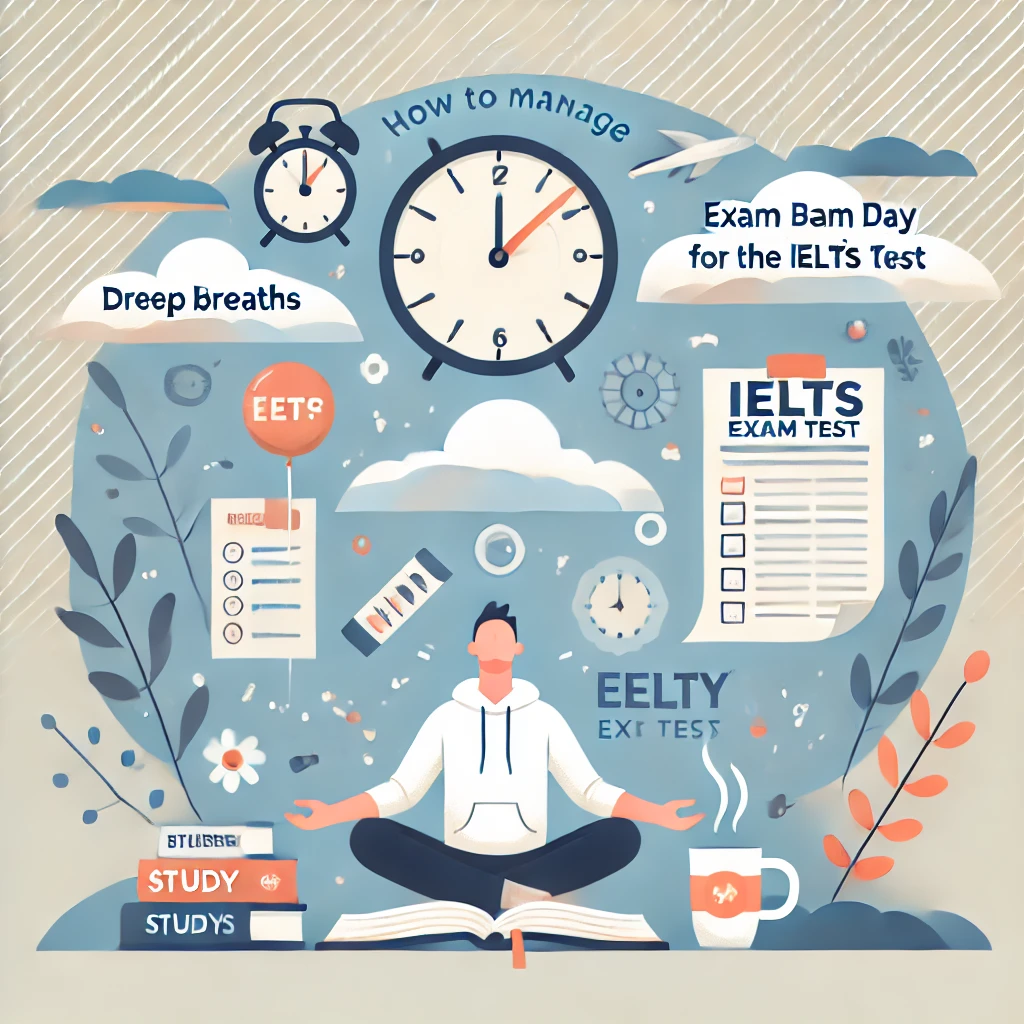How to Manage Exam Day Anxiety for the IELTS Test

Preparing for the IELTS exam is a big step toward achieving your academic or professional goals. However, exam day anxiety can be a major hurdle, even for well-prepared candidates. Stress can affect your focus, concentration, and performance, so learning to manage anxiety is essential for success. Here are practical strategies to help you stay calm, confident, and ready to perform your best on the IELTS exam day.
1. Prepare Thoroughly in Advance
Anxiety often stems from the fear of the unknown, so the best way to combat it is by being fully prepared. Familiarize yourself with the exam format, types of questions, and timing for each section.
Tips:
Practice with sample tests under timed conditions.
Focus on areas where you feel less confident.
Review common topics for the Speaking and Writing sections.
Being well-prepared can boost your confidence and reduce pre-exam jitters.
2. Create a Relaxing Pre-Exam Routine
Establishing a relaxing routine the night before and the morning of the exam can make a significant difference in your stress levels.
Tips:
Get a full night’s sleep, aiming for 7-8 hours.
Prepare everything you need (ID, stationery, water) the night before.
On the morning of the exam, avoid last-minute cramming. Instead, focus on calming activities like light stretching, meditation, or listening to music.
A well-planned morning can help you enter the test room feeling refreshed and composed.
3. Practice Deep Breathing Techniques
Deep breathing is a powerful tool for calming your mind and reducing physical signs of anxiety, such as a racing heart or shallow breathing.
How to Practice:
Take a slow, deep breath in for a count of four.
Hold it for a count of four.
Exhale slowly for a count of four.
Repeat this process 3-5 times until you feel your body relax.
Practicing deep breathing before and during the exam can help you stay grounded and focused.
4. Visualize Success
Visualization is a technique used by many successful athletes and professionals to overcome performance anxiety. Visualize yourself confidently answering questions, staying calm, and completing each section with ease.
Steps for Visualisation:
Close your eyes and imagine yourself in the exam room, feeling calm and in control.
Picture yourself understanding the questions easily and responding confidently.
Imagine the sense of satisfaction you’ll feel once the exam is over.
A positive mindset can help reduce anxiety and boost your self-belief.
5. Arrive Early and Get Comfortable
Running late can heighten anxiety, so plan to arrive at the test center with time to spare. Familiarize yourself with the surroundings, and find a quiet spot to collect your thoughts.
Tips:
Aim to arrive at least 30 minutes before the exam.
Take a few moments to breathe, relax, and visualize your success.
Chat with other test-takers if it helps to calm your nerves, but avoid discussing the test content to keep your focus clear.
Arriving early and settling in can create a sense of control and reduce last-minute stress.
6. Focus on One Question at a Time
When you start the exam, focus on answering one question at a time. Thinking about the entire test or the time left can increase stress and distract you from the task at hand.
Strategies:
When reading a question, remind yourself to focus only on what’s in front of you.
If you get stuck, move on and return to it later.
Use a steady pace, but don’t rush. Practicing with timed mock tests can help build this habit.
Staying in the moment helps you stay calm and make the most of your preparation.
7. Turn Nervous Energy into Motivation
A certain amount of nervous energy can actually enhance focus and performance if channeled correctly. Instead of seeing it as anxiety, view it as excitement or motivation to perform well.
Reframing Tips:
Remind yourself that some nerves are natural and a sign that you care about the outcome.
Focus on the positive impact this test will have on your future.
Replace self-doubt with affirmations like, “I am well-prepared and capable.”
Reframing anxiety as motivation can help keep your energy focused and productive.
8.Take Mini Breaks During the Test
While time is limited, taking a few seconds between sections or even questions to pause, stretch, or take a deep breath can help reset your focus.
How to Use Breaks:
During brief pauses, close your eyes, take a deep breath, and release any tension in your shoulders.
Between sections, give yourself a mental “reset” by taking a quick stretch or deep breath.
These mini-breaks can help prevent mental fatigue and reduce stress throughout the exam.
9.Trust Your Preparation and Be Kind to Yourself
Remember that the IELTS is just one step in your journey, and you’ve prepared well. Don’t be too hard on yourself or let perfectionism add unnecessary pressure.
Mindset Tips:
Focus on doing your best rather than achieving perfection.
After each section, avoid dwelling on past answers and concentrate on what’s next.
Remind yourself that it’s okay if not everything goes perfectly. You’re prepared to do your best, which is what matters most.
A compassionate mindset can help you stay calm, focused, and resilient during the exam.
